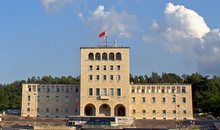
 Flash News
Flash News
Theth action, resident in tears: I built on my land with my life's expenses, the state should not destroy it
Directors targeted! After Fier and Durrës, Rama arrives in Elbasan
Name/Identification of the 23-year-old found dead near Shkopet Lake
IKM action in Theth, residents come out in protest
Reported missing by his father, 23-year-old found dead near Shkopet lake

The German government will double the number of workers from the Balkans, regardless of qualification, to receive a work visa. Unions fear the influx of free labor from the Balkans.
According to data from the Institute for Labor Market and Occupational Studies (IAB) there are currently 1.98 million job vacancies in Germany. To act against the chronic labor shortage, the German government plans to liberalize the relevant labor migration law. A part of the legal package is the so-called "Regulation of the Western Balkans. The government envisages two fundamental changes: On the one hand this regulation will no longer be limited in time - the current regulation lasts until the end of 2023 - on the other hand the contingent of workers from the Balkans will double to 50,000 workers per year.
Work permit - without qualification
When in the second half of 2015, at the height of the refugee crisis, more than 1 million refugees arrived from Syria, Iraq and Afghanistan via the Balkan route, they were joined by many people from the 6 countries of the Western Balkans. They then accounted for 30% of asylum applications, although almost all applications were not recognized. Merkel's government then closed agreements with the Balkan countries on the acceptance of returned refugees and in 2016 the Western Balkans Regulation was approved. It allowed the arrival of a contingent of job seekers without the bureaucratic obstacles of presenting qualifications. Two criteria had to be met: The application for the work permit had to be submitted to the German embassies in these countries and you had not previously applied for asylum.
A regulation that had to satisfy all parties. In Germany there would be regulated immigration of unskilled or medium-skilled labor. On the other hand, the difficult situation of the labor market in these countries would be eased, where especially the youth suffers from unemployment. In Kosovo, for example, unemployment reaches 21%, that of young people even 55%. Thus, it is not surprising that as a result of the regulation, the Federal Labor Agency until the end of 2020 has granted 260,000 visa permits in principle and 98,000 work visa permits from applicants from the Western Balkan countries.
Precarious work on construction sites
This problem is more noticeable in the construction branch. The Construction Industry Association gave up last year on extending the fee-based payment agreement. Workers can only be paid a minimum wage of 12 euros an hour, which is much less than before. In the past, 13 to 16 euros per hour were paid in this branch.
In this way employers can put pressure on those who demand a higher wage - because there is always a labor force that costs less. On the other hand, they do not have to fear the trials. Workers from the Balkans are a particularly vulnerable group, they do not know their rights, and for many from the Balkans the working conditions are unacceptable compared to the countries they come from. Added to this is the fact that state controls are very few./ Dĭ
Latest news


Hoxha: We will have a parliament that will surpass any comedy program!
2025-07-09 10:10:32

Directors targeted! After Fier and Durrës, Rama arrives in Elbasan
2025-07-09 09:53:57
Name/Identification of the 23-year-old found dead near Shkopet Lake
2025-07-09 09:42:34
IKM action in Theth, residents come out in protest
2025-07-09 09:34:54
Reasons why the EU has not imposed new sanctions against Russia
2025-07-09 09:18:35
DW: Online scams increase human trafficking
2025-07-09 09:01:29

Reported missing by his father, 23-year-old found dead near Shkopet lake
2025-07-09 08:42:13

Horoscope, what do the stars have in store for you today?
2025-07-09 08:25:44
Sun and rain, Wednesday with unstable weather
2025-07-09 08:06:58
Posta e mëngjesit/ Me 2 rreshta: Çfarë pati rëndësi dje në Shqipëri
2025-07-09 07:52:02

Tabaku: Salianji bore a political cost that no one in Albania has borne
2025-07-08 22:36:15


Sekretet për të shijuar verën si një ‘profesionist’
2025-07-08 21:45:06


Albania's Waste Crisis: Toxic Smoke and Deep Governance Problems
2025-07-08 21:13:07
Alarming pollution in Fushë-Arrëz, copper factory waste turns the Fan River red
2025-07-08 21:07:14

Poll/ How do you assess the Prime Minister's intervention in local government?
2025-07-08 20:40:01
28 arrested in Italy and Spain for drug trafficking, including an Albanian
2025-07-08 20:24:14
Residents clash with police in Theth: We are on our land
2025-07-08 20:11:41
Death of 27-year-old in Lipjan, Osmani: To be investigated independently!
2025-07-08 20:06:52
Trump promises US will send more weapons to Ukraine
2025-07-08 19:54:25

EU targets health, education, police and cadastre as areas of corruption
2025-07-08 19:23:34




Salianji after his return: I did not oppose for functions, but for vocation
2025-07-08 18:23:15
Will he run in the 2029 elections? Here's how Salianji answers
2025-07-08 18:16:09
Boat captain drowns after diving into water to save two tourists in Shkodra
2025-07-08 18:05:12
Salianji from the DP headquarters: I brought a drug trafficker to justice
2025-07-08 18:03:26
After Fier, Rama "landes" in Durrës, dismissals expected
2025-07-08 17:53:32
Ervin Salianji arrives at the blue headquarters, welcomed by supporters
2025-07-08 17:45:12

EU approves final steps for Bulgaria's Eurozone membership
2025-07-08 17:43:06

Zhupa after Salianj's release: Inspiration for every opposition member
2025-07-08 17:19:39
Actor David Killick passes away
2025-07-08 17:09:23



Threatened with dismissals, Rama arrives at the Fier municipality
2025-07-08 16:39:19
Extreme temperatures temporarily close Acropolis in Greece
2025-07-08 16:30:34

A plot of cannabis is discovered in Mazha, Kruja
2025-07-08 16:13:48

Republika Srpska allocates additional 22 million euros for lobbying in the US
2025-07-08 15:52:04

Spices that protect you from mosquitoes!
2025-07-08 15:30:03

Accident on the Vlora-Qeparo axis, one injured
2025-07-08 15:11:52
Berat, 17 years part of UNESCO's world heritage
2025-07-08 15:03:30


Cost of living increases, inflation rises to 2.4% in June, driven by food
2025-07-08 14:29:54
VIDEO/ Restaurant roof collapses in Italy, one victim and ten injured
2025-07-08 14:18:44
Requested release from cell, Supreme Court leaves Veliaj in prison
2025-07-08 14:07:41
TikTok shutdown/ Austrian media: Rama benefited politically from the app ban
2025-07-08 13:48:25
Acropolis temporarily closed due to heat
2025-07-08 13:31:09



Salianj's release/Berisha: He was politically condemned by Rama and Xhafa!
2025-07-08 13:00:13

Knife attack on Peshkopia Boulevard
2025-07-08 12:44:10


Fier Court decides on the conditional release of Ervin Salianj
2025-07-08 12:15:23
Cost of living increases, inflation rises to 2.4% in June due to food
2025-07-08 12:00:16


Requesting conditional release, Ervin Salianji arrives at the Fier Court
2025-07-08 11:16:36
The first phase of university applications begins today
2025-07-08 11:10:52
Fire in Lura, flames endanger the National Park
2025-07-08 10:53:43
Trump warns of 35% tariffs on Serbia and 30% on Bosnia and Herzegovina
2025-07-08 10:37:32
Thethi rooster and the dung cock
2025-07-08 10:24:01

Fire in Dukat endangers Llogara National Park
2025-07-08 10:01:39
International drug search: 36-year-old arrested in Durrës (NAME)
2025-07-08 09:50:48
Thethi, tourists "criticize" modern trend
2025-07-08 09:39:54
Fire on Mount Dukat still active, Llogara National Park at risk
2025-07-08 09:28:12
Veliaj's appeal to be heard today in the High Court
2025-07-08 09:16:02
"Bad sign for democracy"/ Parliament neglects reporting by institutions
2025-07-08 09:04:56
Today's hearing at the Fier Court, Salianji requests conditional release
2025-07-08 08:56:39


Horoscope, what do the stars have in store for you today?
2025-07-08 08:16:19
Weather forecast/ How temperatures will vary throughout the day
2025-07-08 08:02:37
Morning Post/ In 2 lines: What mattered yesterday in Albania
2025-07-08 07:48:30


